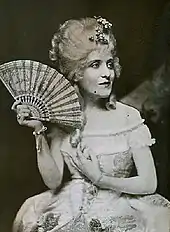The Song of Songs (play)
The Song of Songs is a 1914 play written by Edward Sheldon, based on the 1908 German novel Das hohe Lied by Hermann Sudermann, which had been translated to English under the title The Song of Songs. Producer A. H. Woods staged the play on Broadway at his Eltinge 42nd Street Theatre, where it was a box office success. The play was the basis of several movie and radio adaptations.
| The Song of Songs | |
|---|---|
_(14583089187).jpg.webp) Stage photograph of The Song of Songs (1914) | |
| Written by | Edward Sheldon |
| Based on | Das hohe Lied by Hermann Sudermann |
| Date premiered | December 22, 1914 |
| Place premiered | Eltinge Theatre |
| Original language | English |
| Genre | Drama |
Plot
Shop girl Lily Kardos marries Senator Calkins, but secretly continues to see her ex-lover Richard Laird on the side. Calkins abandons Lily when he discovers her infidelity. Lily then begins a relationship with Stephen Bennett. Stephen's uncle Phineas, aware of Lily's reputation, gets her drunk at a party to reveal the truth about her to Stephen. Her inappropriate behavior causes Stephen to break up with her. In the final act, she returns to Richard Laird.
Cast and characters
The characters and cast from the Broadway production are given below:

| Character | Broadway cast[1] |
|---|---|
| Ruby Purcell | Maud Allan |
| A Drummer | William Stone |
| A Customer | Eleanor Seybolt |
| Della Shay | Helena Rapport |
| Lily Kardos | Irene Fenwick |
| A Detroit Chap | Forrest Winant |
| A Messenger Boy | John Coss |
| Richard Laird | Cyril Keightley |
| Senator Daniel E. Calkins | John Mason |
| Anna Merklee | Dorothy Donnelly |
| Wilkins | H. C. Lewis |
| Jane | Josephine Robbins |
| Marcel | Francis M. Verdt |
| Lindsey McAlpin | James Lounsberry |
| Judge Atwell | R. A. Brandon |
| Stephen Bennett | Ernest Glendinning |
| Achille | A. Romaine Callander |
| Maurice | Claus Bogel |
| Phineas K. Bennett | Thomas A. Wise |
| Louise | Beatrice Clevenger |
| Emma | Grace Wall |
Reception
The play received a mixed reception from critics.[2] The New York Times said the Broadway production was well-acted and "deeply interesting", but was also too long, flawed, and generally inferior to the novel.[1] The Brooklyn Daily Eagle also complimented the acting, but said the play's primary draw was "sensationalism" that would "attract the mentally depraved".[3]
The drama critic for Life magazine said the play served only to "pique depraved curiosity".[4] Drama critic Walter Prichard Eaton said Sheldon made a critical error in moving the location of the story from Europe to America, thereby making some of the characters' actions less plausible.[5]
Adaptations
In 1918, Famous Players-Lasky produced a silent film adaptation of The Song of Songs, directed by Joseph Kaufman and starring Elsie Ferguson. This movie is now considered a lost film.[6] In 1924, the same studio remade the story under the title Lily of the Dust, directed by Dimitri Buchowetzki and starring Pola Negri. This film is also lost.[7]
In 1933, Paramount Pictures (the successor of Famous Players-Lasky) made a sound version of The Song of Songs, directed by Rouben Mamoulian and starring Marlene Dietrich. On December 20, 1937, Dietrich reprised her role in a radio play presented by the Lux Radio Theatre on the CBS Radio Network.
References
- "Sheldon Play Has Cumulative Force". The New York Times. 64 (20, 787). December 23, 1914. p. 13.
- Bordman, Gerald (1995). American Theatre: A Chronicle of Comedy and Drama, 1914-1930. New York: Oxford University Press. p. 17. ISBN 0-19-509078-0.
- "Impressions of the Play: The Song of Songs". Brooklyn Daily Eagle. 74 (354). December 23, 1914. p. 6 – via Newspapers.com.

- Metcalfe, James S. (January 7, 1915). "The Musical Show on Top Again". Life. 65 (1680). p. 25.
- Eaton, Walter Prichard (1916). Plays and Players, Leaves from a Critic's Scrapbook. Cincinnati: Stewart & Kidd. p. 104. OCLC 651563933.
- "American Silent Feature Film Survival Catalog: The Song of Songs / Joseph Kaufman". Library of Congress. October 8, 2015. Retrieved January 24, 2016.
- "American Silent Feature Film Survival Catalog: Lily of the Dust / Dimitri Buchowetzki". Library of Congress. October 8, 2015. Retrieved January 24, 2016.